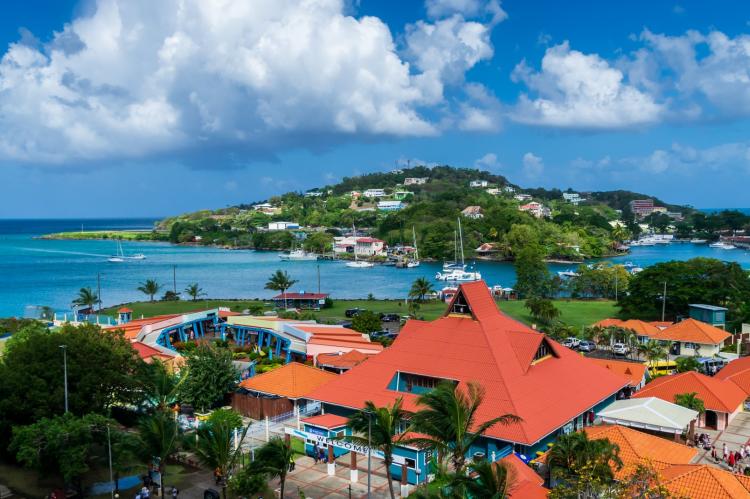Saint Lucia Joins the Race to Legalize Cannabis
The race to become the first Caribbean country with legal cannabis is turning into a sprint, with Saint Lucia announcing plans to join Bermuda, and the U.S. Virgin Islands in drafting adult use legislation.
On Tuesday, Bradley Felix, Saint Lucia’s Minister of Commerce and Investment, announced the government’s decision to draw up such a bill. This comes one month after the government-established Cannabis Commission delivered its report, which made an economic case for cannabis reforms as a way to diversify Saint Lucia’s agricultural industry.
Felix said that a majority of residents of Saint Lucia believe that reforms, such as legal cultivation, processing, and exports, would be beneficial to the island’s tourism-dependent economy. He cited a public consultation—a public discussion that was broadcast on television and included a call-in segment—that followed the release of the Commission’s report, along with results of a government-administered poll that found that 73% of 933 respondents supported the establishment of a cannabis industry. A poll conducted by Caribbean Development Research Services in 2018 had found that 51% of the population support cannabis-related legislative reform, with 18% supporting the implementation of adult use regulations and 33% supporting decriminalization.
“There was consensus with regards to authorizing the Ministry of Commerce and the Attorney General Chambers to draft the legislative and the regulatory framework to assist in the implementation of a cannabis industry,” Felix said during a press conference Tuesday, explaining that public feedback played a major role in the decision to move the process forward. “That also includes looking at personal use, religious use, and medicinal use.”
A final vote will be held by Parliament, according to Felix, before the end of the current government’s tenure, in the first half of next year.
Saint Lucia is among an ever-shrinking group of countries in the Caribbean that have yet to enact cannabis reforms, either decriminalization or legalization for medical or adult use. The island hopes to accelerate the process by learning from other countries in the region that have enacted similar reforms, according to Dylan Norbert-Inglis, the Ministry’s Legal Officer.
Once the policy development and framework is complete, discussions will then be moved to set a schedule for when a vote will take place, Inglis said during the press conference. “So, we are quite some ways away from having anything on the books for cannabis.”
According to Felix, support is expected across political lines, with the country’s opposition leader, Philip Pierre, having already pledged his support.
“We believe that it is time for a conclusion and closure on this issue while ensuring that the people who suffered prosecution—Rastafarians—benefit from any decision on cannabis use,” Pierre said during a national address last month. “This is not a time for politics but reconciliation, good sense, and protection of health and livelihoods.”
Although the Cannabis Commission’s full report, titled “An Economic Analysis of the Regulation of the Cannabis Industry in Saint Lucia,” is unpublished, several components have been shared and discussed by the Commission. The report contains a first-in-the-region proposal to create a farmer’s cooperative as the primary regulator for cannabis cultivation.
At the island’s final public consultation on the proposed reforms on July 9, Michael Gordon, the Commission’s chair, explained that this plan would allow farmers to have greater influence over the direction of the industry, while at the same time having the highest potential to repair the social and economic consequences of prohibition. Advancing decriminalization only, according to the Commission’s economic analysis, would cost the state upwards of $1 million (USD) to enforce annually, while having no impact on its gross domestic product.
Parts of the commission’s report, as detailed at the consultation, propose that foreign investors play a small role in the cultivation of cannabis, limiting them to manufacturing and processing in the early years of the industry’s establishment. The suggested models, titled loosely as the “legalized-competitive model” and “legalized state-controlled model,” would give birth to an industry with an estimated size of $200 million (USD) with government revenues via taxation estimated at $30 million (USD).
“We are elated that the decision has come down,” Andre de Caires, who led the advocacy group Cannabis Movement for over a decade and served as a member of the country’s Cannabis Commission, told Cannabis Wire. “Our work now shifts from advocacy to policy. We are focused on having the cooperative model implemented, since it saves foreign investors from buying or leasing land and could significantly boost domestic employment.”
The Prime Minister, Allen Chastanet, has also expressed interest in boosting domestic opportunities around the cultivation of cannabis, specifically with an eye on eliminating illicit cultivation.
“Are we going to allow foreign investors to come in where our farmers are going to be used as workers, or are we going to be in the production of the product ourselves,” he said in his last public statement on the topic in February.
- Log in to post comments

